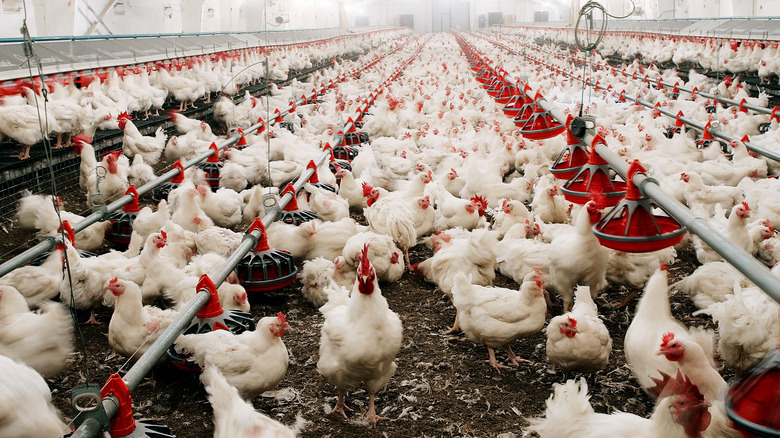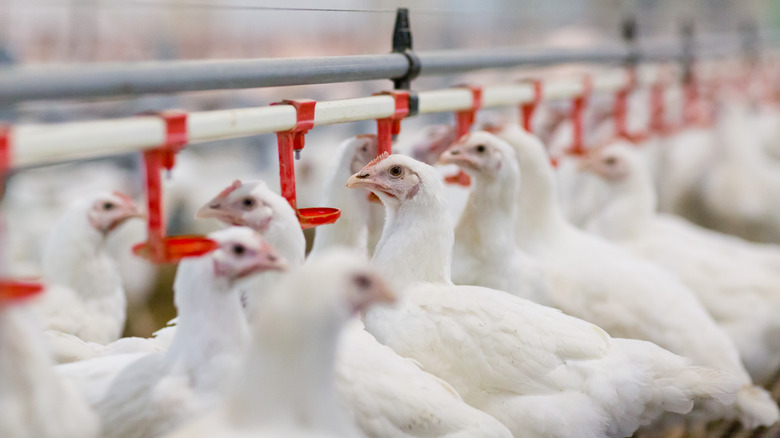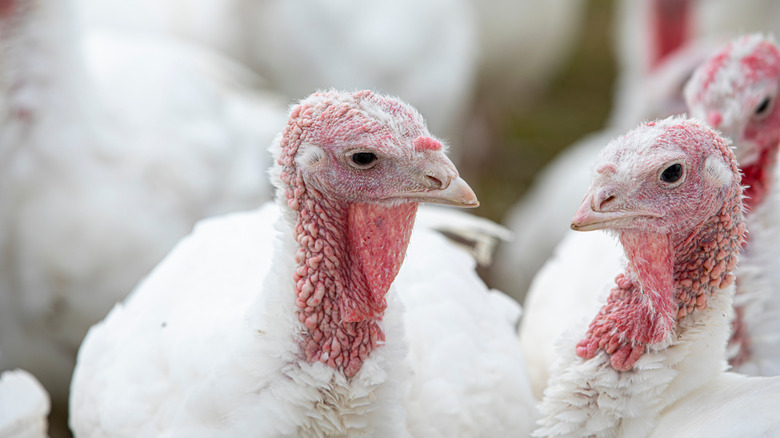Why US Farms Are Being Accused Of Animal Cruelty For Response To Bird Flu Outbreak
Correction 3/10/22: A previous version of this article stated that the American Veterinary Medical Association submitted an internal resolution asking for all forms of ventilation shutdown to be classified as "not recommended" for poultry and pigs. This resolution was submitted by a group of members, not the association as a whole.
Have you heard about the recent bird flu outbreak that's sweeping across the U.S.? Per a statement released last month by the U.S. Department of Agriculture (USDA), highly pathogenic avian influenza (HPAI) was discovered in a backyard flock of chickens in Virginia and among a large population of chickens on a Tyson farm in Kentucky. According to the Centers for Disease Control (CDC), HPAI can cause illness and death in domestic poultry, but for humans, consuming the affected meat does not pose a risk as long as it's cooked to an internal temperature 165 degrees Fahrenheit.
In response to the news of the outbreak, Tyson basically told consumers not to worry. As reported by the Washington Post, the chicken producer pledged to step up its sanitation measures at its facilities in the region, quarantining the Kentucky location and testing other flocks for HPAI before shipping birds to market. Additionally, the USDA shared infected farms would employ some measure of "depopulation," which involves killing some of the animals in order to thin the herd and reduce the risk of viral spread. While exact figures for how many chickens have been killed haven't been reported, the methods used are coming under fire by veterinarians and animal rights advocates.
What exactly is "depopulation"?
When a viral outbreak sweeps through a population of livestock, it's not uncommon for affected animals to be destroyed — and sometimes on a massive scale. According to the Indiana State Board of Animal Health, for example, a recent HPAI outbreak in the state led to the destruction of 29,000 turkeys. And in 2020, according to the Guardian, millions of farm animals across the U.S. were killed after the pandemic shut down slaughterhouse operations and left animals unattended. And while euphemistic terms such as "depopulation" and "destruction" are used to describe these mass deaths, veterinarians and animal advocates are speaking out against the actual methods used to kill the livestock.
In a separate report by the Guardian, two common methods for mass killing livestock — the use of firefighting foam and something called "ventilation shutdown" — are being attacked by groups such as the U.S.-based Animal Welfare Institute. Infected poultry flocks are sprayed with firefighting foam in one method of execution, which blocks their airways and suffocates them; when ventilation shutdown is used, extremely high heat and steam are applied to the animals, which causes them to die of heatstroke.
Such methods of killing are illegal by European Union standards, notes the Guardian. "I have treated animals with heatstroke and it's horrible," Gwendolen Reyes-Illg, a veterinary adviser to the Animal Welfare Institute and critic of the methods, told the outlet.
Many are calling for reform
Animal rights advocates are not the only groups calling out these practices as barbaric. Last year, in response to 2020's COVID-19-related shutdowns of animal livestock operations and slaughterhouses that led to the depopulation of millions of animals in the U.S., some members of the American Veterinary Medical Association (AVMA) submitted an internal resolution asking for all forms of ventilation shutdown (VSD) — the use of high heat and steam to mass-kill animals — to be classified as "not recommended" for poultry and pigs.
"The veterinarians making these choices made no small effort to come to that conclusion that VSD plus was the last effective, available, and efficient type of option," Dr. Bill Williams, an AVMA alternative delegate from Iowa, told AVMA House of Delegates. "I can tell you those people were permanently affected by that decision."
Research suggests that veterinary professionals involved in mass cullings suffer as a result of their work. According to the Guardian, in one study, 10% of surveyed swine veterinarians involved in such depopulation have thought about suicide, and 23% said they needed mental health counseling.
If you or anyone you know is having suicidal thoughts, please call the National Suicide Prevention Lifeline at 1-800-273-TALK (8255).


